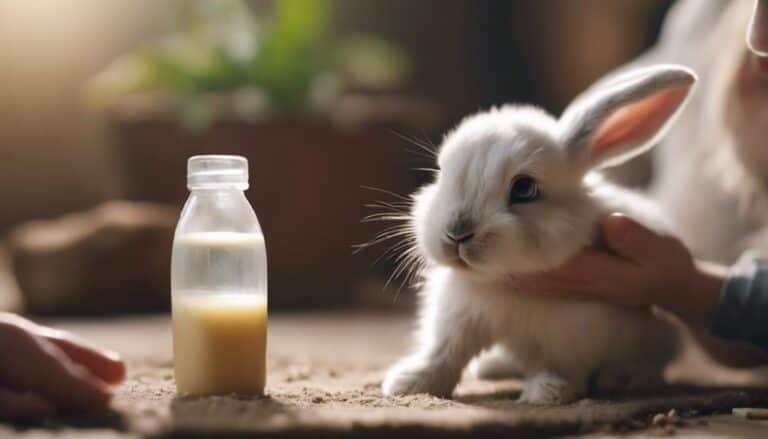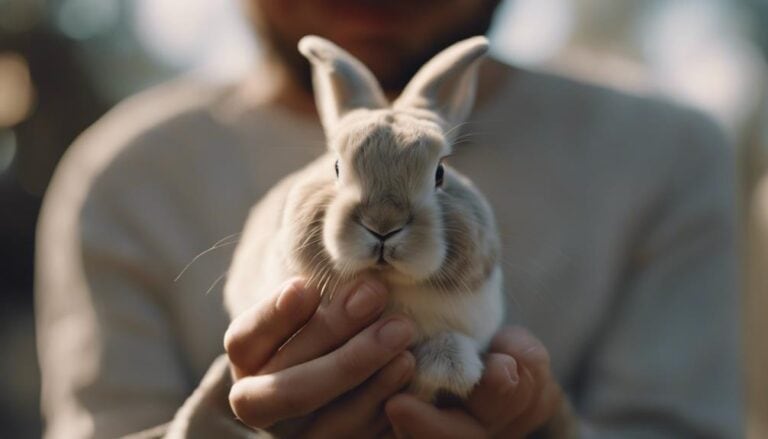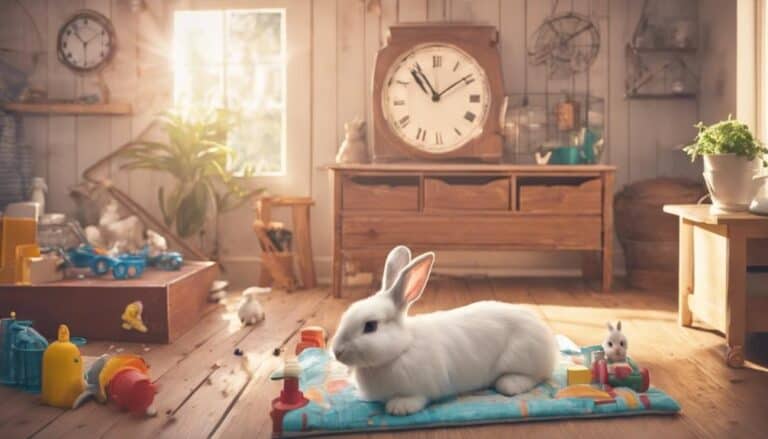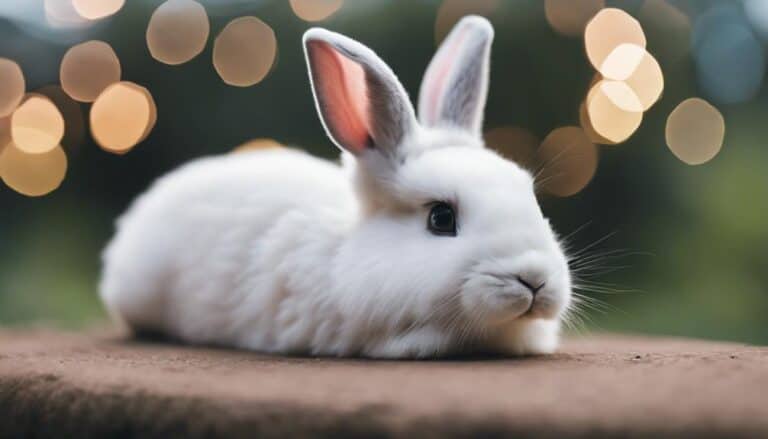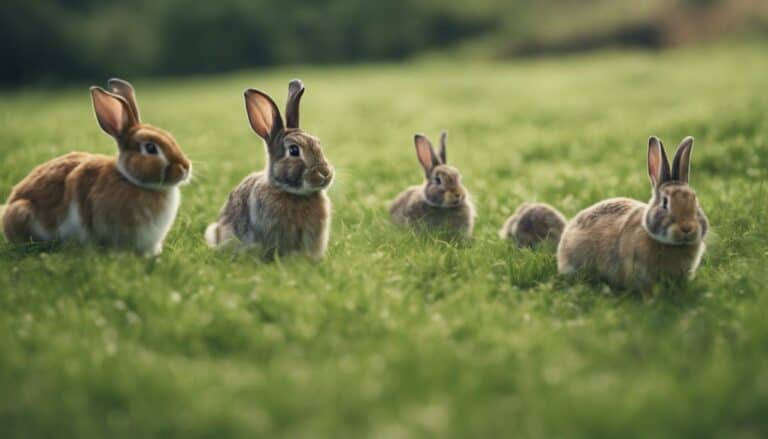If you've ever wondered about the mysteries behind bunnies' eyes, you might be surprised to learn that these charming creatures possess a fascinating ability: their eye colors might not always stay the same.
Have you ever noticed a slight shift in hue or shade in your bunny's eyes and pondered on the reasons behind this intriguing phenomenon? Stay tuned to uncover the enthralling insights into why bunnies' eyes may undergo color changes, shedding light on the enchanting world of rabbit ocular transformations.
Contents
- 1 Key Takeaways
- 2 Reasons for Bunnies' Eye Color Changes
- 3 Genetic Factors Influencing Eye Color
- 4 Health Conditions Impacting Eye Color
- 5 Common Eye Color Variations in Bunnies
- 6 Understanding Bunny Eye Color Changes
- 7 Care Tips for Changing Bunny Eye Colors
- 8 – Can Molting Affect a Bunny’s Eye Color?
- 9 Frequently Asked Questions
- 10 Conclusion
Key Takeaways
- Genetic factors and pigmentation influence bunny eye color changes.
- Health conditions can lead to variations in bunny eye color.
- Regular vet check-ups aid in monitoring bunny eye health.
- Environmental factors and nutrition impact bunny eye color shifts.
Reasons for Bunnies' Eye Color Changes
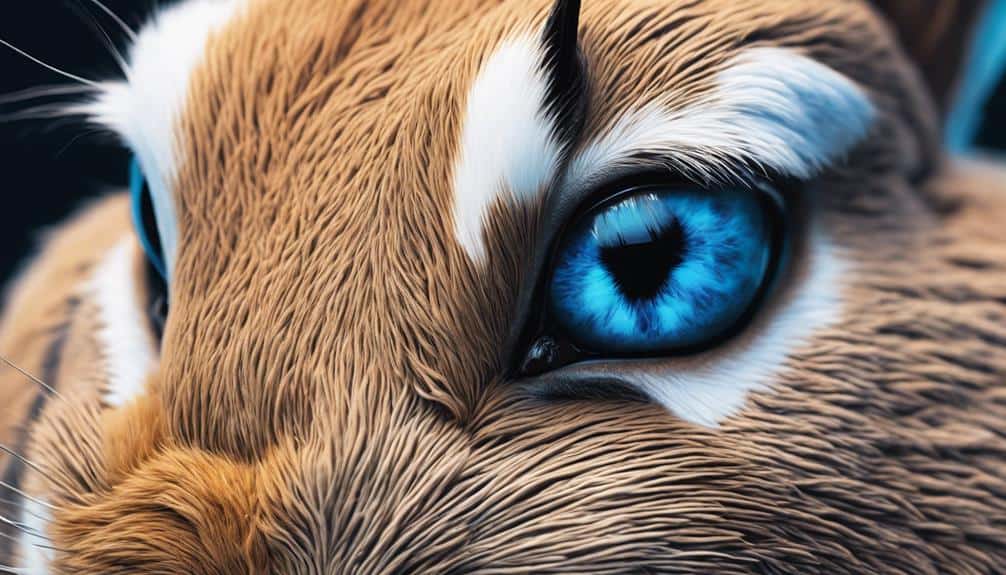
When considering the reasons for bunnies' eye color changes, it's important to understand the complex interplay of genetic factors and pigmentation interactions that influence these variations. Rabbits, like humans, can display changes in eye color due to genetic factors. Some rabbits may even exhibit sectoral heterochromia, where different regions of the same iris have varying colors, creating unique patterns. Additionally, aging can play a role in altering a rabbit's eye color, with eyes often darkening, especially in albino rabbits, as they grow older.
Understanding the pigmentation interactions in a rabbit's eyes is crucial in comprehending these color changes. While most eye colors in rabbits are considered normal, white eyes aren't a recognized color and can be indicative of underlying medical conditions like cataracts. It's also essential to note that flash red eyes seen in photos of rabbits aren't a true eye color change but rather a result of the reflection of the camera flash. By recognizing these factors, one can better appreciate the various reasons behind bunnies' eye color modifications.
Genetic Factors Influencing Eye Color
To understand the range of eye colors in rabbits, it's important to take into account the genetic factors that influence these variations. Brown eyes in rabbits are mainly influenced by a dominant gene, resulting in a spectrum of shades from light to dark brown. On the other hand, amber eyes, more commonly found in wild rabbits, occur when the yellow gene overrides the brown gene in domestic rabbits.
Blue eyes in rabbits, a recessive trait, are influenced by the interplay of eumelanin and pheomelanin pigments. The rarer blue/grey eyes have a distinct pigment composition with small eumelanin and large pheomelanin particles. Pink eyes in rabbits stem from a genetic mutation that dilutes the brown pigment to pink, requiring specific recessive gene copies for expression.
Understanding these genetic mutations and the role of eumelanin particles in eye coloration provides valuable insights into the diverse eye colors observed in rabbits.
Health Conditions Impacting Eye Color
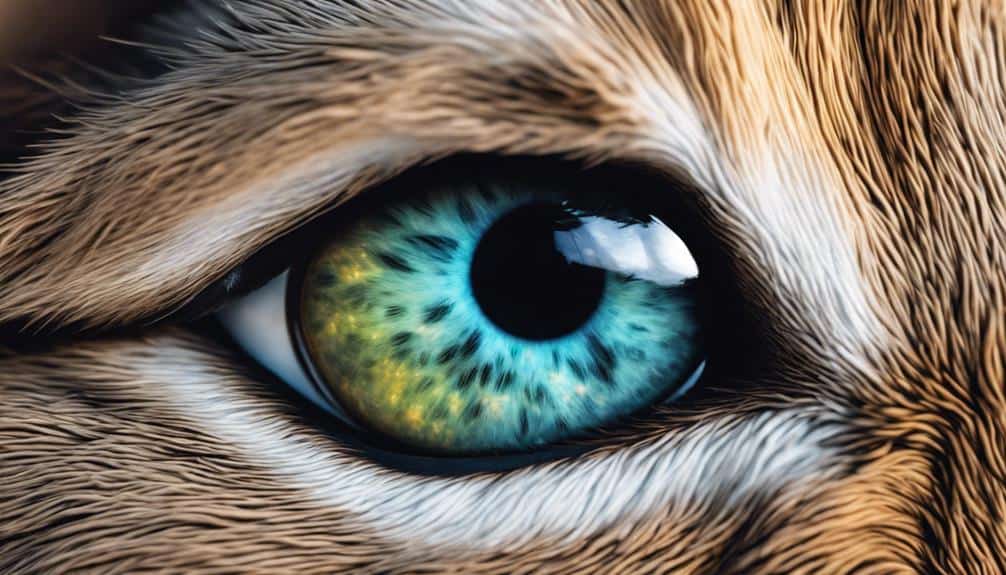
Certain health conditions, such as cataracts or genetic mutations, can impact a bunny's eye color. When it comes to your furry companion, keeping an eye on changes in their eye color is important for their overall health. Here are a few key points to keep in mind:
- Genetic Mutations: Some bunnies may have genetic mutations that result in unique eye colors or changes over time. These mutations can sometimes be harmless, but monitoring them for any signs of underlying health issues is vital.
- Underlying Health Issues: Eye color changes in bunnies can sometimes be a symptom of broader health problems. Regular veterinary check-ups can help identify and address any potential concerns early on.
- Veterinary Attention: If you notice significant changes in your bunny's eye color, seeking veterinary attention promptly is crucial. A rabbit-savvy veterinarian can provide expert guidance on how to manage any health conditions affecting your bunny's eyes.
Common Eye Color Variations in Bunnies
Did you know that rabbits can exhibit a variety of eye colors due to genetic factors and environmental influences?
Eye color variations in bunnies are influenced by intricate interactions of pigments and specific gene requirements.
From blue and grey to marbled eyes with unique iris patterns, the colors of a bunny's eyes can be quite diverse.
Eye Color Genetics
Brown eyes, the most prevalent eye color in domestic rabbits, exhibit varying shades ranging from light to dark brown. Understanding the genetics behind eye color in bunnies can shed light on the fascinating variations you may observe:
- Amber Eyes: More common in wild rabbits, amber eyes result from the yellow gene overpowering the brown gene.
- Blue Eyes: A result of specific pigment interactions, with particle size influencing the shade of blue.
- Pink Eyes: A rare genetic mutation that dilutes brown pigment to a pink hue, with hints of brown or blue visible.
These genetic factors play an important role in determining the eye color variations seen in bunnies and contribute to the unique beauty of each individual rabbit.
Environmental Influences
When considering common eye color variations in bunnies, environmental influences play a significant role in how a rabbit's eye color may appear. Lighting conditions, shadows, and reflections all contribute to the perception of eye color in rabbits. Environmental factors such as sunlight or artificial light can make a bunny's eyes appear lighter or darker than they actually are. This is particularly noticeable in rabbits with lighter colored eyes. Regular observation under consistent lighting is essential to accurately determine a bunny's true eye color. By being mindful of these environmental influences, you can better appreciate the natural variations and beauty in bunny eye colors.
| Factors | Impact on Eye Color in Bunnies |
|---|---|
| Lighting Conditions | Lighter or darker appearance |
| Shadows | Illusions of color changes |
| Reflections | Perception of eye color variation |
Understanding Bunny Eye Color Changes
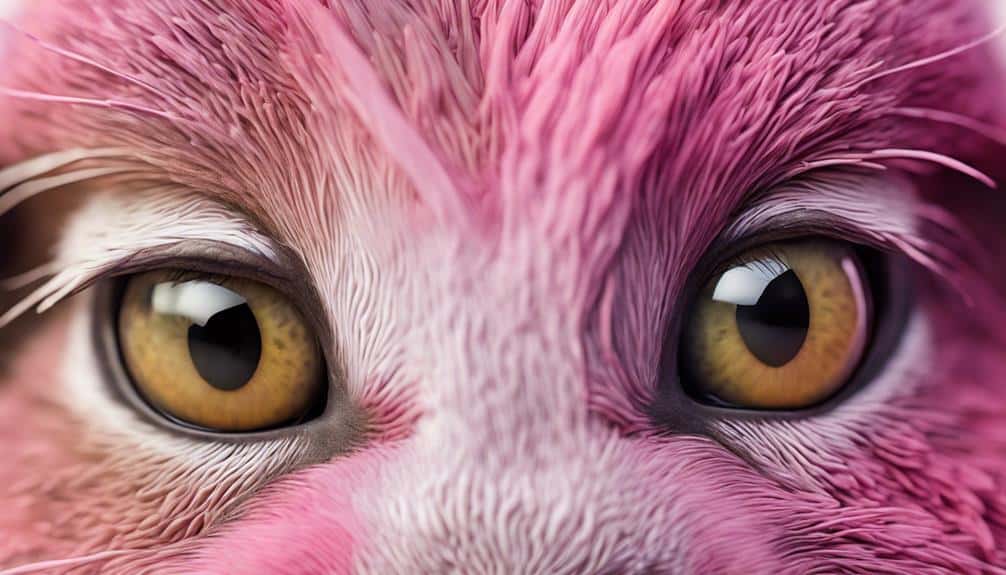
As bunnies mature, their eye colors can undergo subtle or striking changes influenced by various factors such as pigment variations, genetic traits, and potential mutations. Understanding these changes can provide valuable insights into your bunny's health and genetic makeup. Here are some key points to take into account:
- Pigment Variations: Rabbit eye color changes are often due to shifts in pigment concentrations within the iris, leading to alterations in hue or intensity.
- Genetic Factors: Genetic traits play a significant role in determining a bunny's eye color, with specific genes influencing the production of pigments responsible for eye coloration.
- Heterochromia and Mutations: Some rabbits may exhibit heterochromia, where each eye displays a different color, a phenomenon influenced by genetic mutations affecting eye pigmentation.
Care Tips for Changing Bunny Eye Colors
If you notice your bunny's eye color changing, it's essential to take into account their genetics and overall health. Regular veterinary check-ups can help detect any potential issues early on.
Ensuring a well-balanced diet and providing proper care are vital for maintaining your rabbit's eye health.
Eye Color Genetics
Eye color genetics play a significant role in determining the changing eye colors of bunnies. Understanding how genetic factors influence eye color changes can help you better care for your bunny.
Here are some key points to bear in mind:
- Genetic Factors: Bunny eye color is inherited from their parents, so different combinations of genes can lead to various eye colors.
- Age: As bunnies grow and develop, their eye color may naturally change due to genetic factors and maturation.
- Health: The overall health of your bunny can impact their eye color, so maintaining good health through proper diet and veterinary care is essential.
Health Implications
To guarantee high-quality care for your bunny's changing eye colors, closely monitor any shifts that may indicate underlying health concerns. Changes in eye color could signal health issues, so it's essential to stay vigilant.
If you notice sudden or drastic alterations in your bunny's eye color, don't hesitate to consult a vet for professional advice. A balanced diet plays an important role in supporting overall eye health, so make sure your bunny's nutritional needs are met.
Regularly inspect your bunny's eyes for any signs of infection or irritation, as early detection is key. Additionally, create a safe and clean environment for your bunny to prevent eye-related problems.
Prioritizing these factors will help maintain your bunny's eye health and overall well-being.
Maintenance and Care
When caring for rabbits with changing eye colors, it's important to prioritize regular veterinary check-ups to monitor any potential shifts influenced by genetics, age, or health factors. Ensuring the well-being of your bunny's eyes involves the following care tips:
- Proper Nutrition: Providing a diet rich in hay supports healthy eye development.
- Regular Veterinary Check-ups: Scheduled visits with a rabbit-savvy veterinarian can help catch any concerning changes early.
- Environmental Considerations: Factors like exposure to sunlight and stress can impact your rabbit's eye health and color.
– Can Molting Affect a Bunny’s Eye Color?
Yes, bunnies molting information article does influence their eye color. During molting, the new fur growth can cause changes in pigmentation around the eyes, leading to a temporary shift in eye color. Keep an eye on your bunny’s molting patterns to observe any changes in their eye color.
Frequently Asked Questions
Why Did My Rabbits Eye Turn Blue?
Your rabbit's eye turning blue could be due to genetics, specifically a recessive trait. Factors like diet, environment, and age can influence eye color changes. Guarantee proper eye health, consider behavior changes, and seek veterinary care if necessary.
What Does It Mean When Rabbits Eyes Turn White?
When rabbits' eyes turn white, it could signal eye health issues like cataracts. These changes may affect their vision and behavior. White eyes aren't a typical eye color for rabbits and require attention from a vet.
Why Do My Rabbits Eyes Look Red?
Ever noticed your rabbit's eyes look red? It could be due to genetics and lack of pigment, common in albino rabbits. Guarantee eye health by providing dimly lit environments and consider how diet and age impact their eye color.
Why Do Rabbits Eyes Glow?
Your rabbits' eyes glow due to the tapetum lucidum, a reflective layer enhancing night vision by capturing and intensifying light. This adaptation aids in moving through low-light environments and is a natural feature for survival.
Conclusion
You'll be amazed at the magical kaleidoscope of colors that bunnies' eyes can transform into!
From rich browns to shimmering blues, these little marvels can surprise you with their ever-changing hues.
So, keep an eye out for those enchanting shifts in color, and remember to shower your bunny with love and care to witness the stunning beauty of their eyes in all their glory.
It's a sight you won't want to miss!

